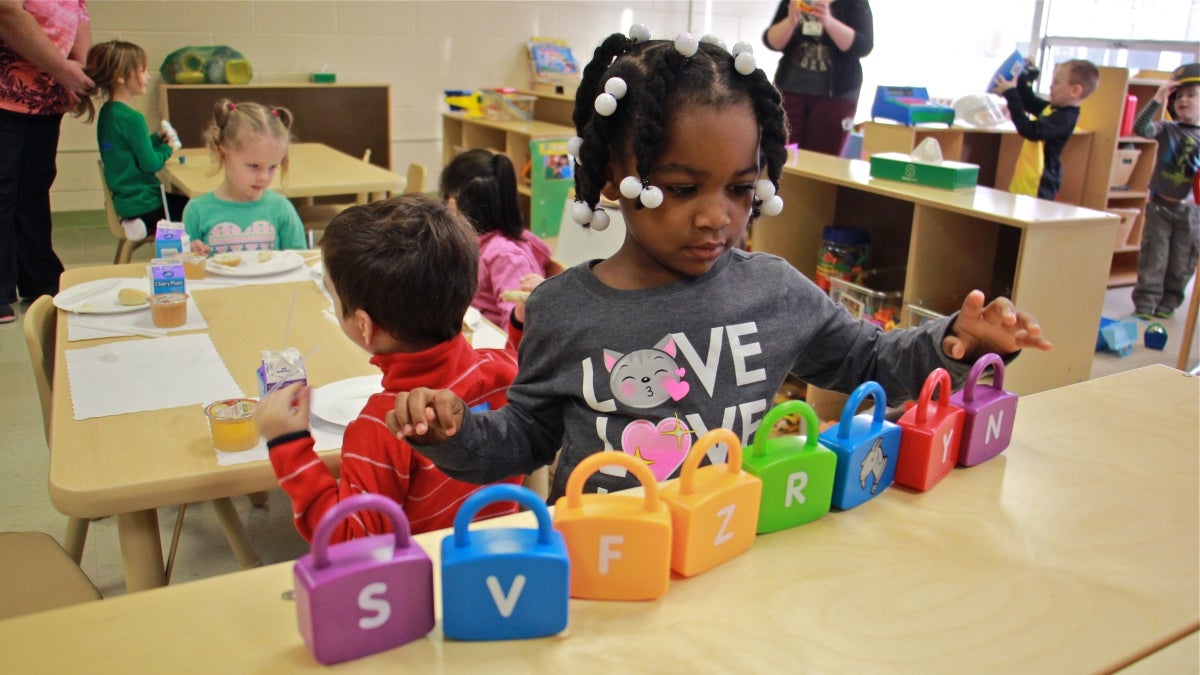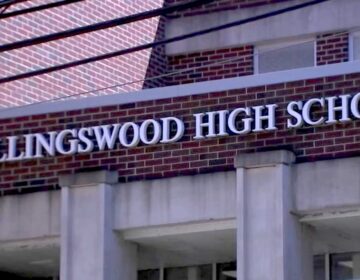Soda tax benefits all, even its biggest critic

Makayla Grant gets busy on her first day of preschool at SPIN-Parkwood on Jan. 4, 2017. (Emma Lee/WHYY, file)
The Philadelphia Beverage Tax benefits Philadelphians. To say otherwise ignores the big picture. Criticism of the tax merely focuses on its short-term effects on the soda industry, at the expense of understanding the long-term benefits of the tax for poor communities in the city. Ironically, the tax also helps its chief critic — the soda industry — by accelerating the industry’s necessary pivot to meet the growing demand for healthy drinks.
I work for an organization that is dedicated to financially empowering Latinos. A lot has been said about how minorities will suffer economically from this tax, but that hasn’t been my experience. That’s why we joined the city in filing an amicus brief in support of the tax.
The benefits of the Philadelphia Beverage Tax are easy to see in poor neighborhoods of the city. To date, the tax has funded 2,000 free, high-quality pre-K slots. This has fueled growth in 88 pre-K programs, 75 percent of which are owned by minorities or women, and created over 250 new jobs. The pre-K expansion also bolstered neighborhood businesses. Nearly half of all pre-K providers engaged building contractors to make facility enhancements, and many parents returned to work because they now have high-quality child care.
By funding additional pre-K seats, we prepare more children for success later in life. According to Public Citizens for Children and Youth, children who attend high-quality preschool have a greater likelihood of staying out of trouble, graduating from high school, and graduating from college. It is estimated that a $1 investment in pre-K today saves the city $7 in future costs.
The Philadelphia Beverage Tax’s focus on education is impressive. In addition to pre-K expansion, it has also funded nine community schools serving 4,500 students and their families, 75 percent of whom live at or below the poverty line. Community schools transform struggling public schools into neighborhood service hubs to address social challenges that keep countless students from succeeding academically. For the Latino community, the hubs are a godsend; more than 60 percent of Hispanic students drop out of high school.
More benefits are yet to come.The revenue from the tax will fund the launch of Rebuild: a $500 million program to renovate parks, rec centers, and libraries. Rebuild will invest in several projects in the poorest of neighborhoods and, through such projects, provide jobs and opportunities for area residents and minority contractors.
The tax also helps its most vocal critic: the soda industry. “The consumer over the last 10 years has already told us that we need to develop brands and packages that are either good for you or better for you,” Canada Dry Delaware Valley Chief Operating Officer Bob Brockway said to Bloomberg News in February. “All that’s happening with this tax is that it’s accelerating that consumer dynamic.”
The soda industry must adapt if it wants to continue making billions in profits. Brockway told Bloomberg News that he hasn’t seen an increase in his sugar-sweetened beverage portfolio in the last eight years. The Philadelphia Beverage Tax had nothing to do with that, as it is only 4 months old. Rather, the global trend results from consumers and doctors being aware of irrefutable research showing that sugary drinks are tied to an increased risk of obesity and diabetes.
The soda industry is aware of its part in fueling this health crisis. In 2014, the American Beverage Association (ABA) pledged to cut calories by 20 percent by 2025 through healthy eating campaigns and offering more zero or low-calorie drinks, including bottled water. The Philadelphia Beverage Tax will help the ABA meet its goal in Philadelphia.
In sum, the Philadelphia Beverage Tax produces positive transformations to the social and business fabric of the city. “Change is the law of life,” said President John F. Kennedy. Those who cling to the past are certain to miss the future.
—
Will Gonzalez is the executive director of Ceiba, a coalition of Latino community-based organizations in Philadelphia. He has over 30 years of experience working on the housing, economic, and civil rights of low- to moderate-income families.
WHYY is your source for fact-based, in-depth journalism and information. As a nonprofit organization, we rely on financial support from readers like you. Please give today.




